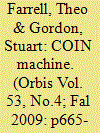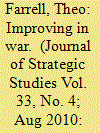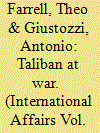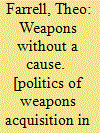|
|
|
Sort Order |
|
|
|
Items / Page
|
|
|
|
|
|
|
| Srl | Item |
| 1 |
ID:
049184


|
|
|
|
|
| Publication |
Strategic and Combat Studies Institute, 1997.
|
| Description |
56p.
|
| Series |
Occasional paper; no. 31
|
| Standard Number |
1874346224
|
|
|
|
|
|
|
|
|
|
|
|
Copies: C:1/I:0,R:0,Q:0
Circulation
| Accession# | Call# | Current Location | Status | Policy | Location |
| 039582 | 355.46/TIL 039582 | Main | On Shelf | General | |
|
|
|
|
| 2 |
ID:
103293


|
|
|
|
|
| Publication |
2011.
|
| Summary/Abstract |
Success in war depends on alignment between operations and strategy. Commonly, such alignment takes time as civilian and military leaders assess the effectiveness of operations and adjust them to ensure that strategic objectives are achieved. This article assesses prospects for the US-led campaign in Afghanistan. Drawing on extensive field research, the authors find that significant progress has been made at the operational level in four key areas: the approach to counterinsurgency operations, development of Afghan security forces, growth of Afghan sub-national governance and military momentum on the ground. However, the situation is bleak at the strategic level. The article identifies three strategic obstacles to campaign success: corruption in Afghan national government, war-weariness in NATO countries and insurgent safe havens in Pakistan. These strategic problems require political developments that are beyond the capabilities of the International Security Assistance Force (ISAF). In other words, further progress at the operational level will not bring 'victory'. It concludes, therefore, that there is an operational-strategic disconnect at the heart of the ISAF campaign.
|
|
|
|
|
|
|
|
|
|
|
|
|
|
|
|
| 3 |
ID:
103846


|
|
|
|
|
| Publication |
2009.
|
| Summary/Abstract |
This article assesses the British military effort in Afghanistan looking at three key elements in the campaign: strategy, military operations, and the inter-agency "Comprehensive Approach." We start by recognising the scale of the challenge that has faced the British: of all the provinces in Afghanistan, Helmand is the toughest to stabilize and secure. We then examine the evolution of all three elements above and find significant improvements in each: a flawed strategy has been corrected; the military have received more resources and become significantly better at COIN; and there is significant progress in the development of the inter-agency approach. In short, what the Americans will find in Helmand is a British COIN machine; a little creaky perhaps, but one that is fit for purpose and getting the job done. We briefly conclude on the prospects and the key to success: namely the development of a more coherent international strategy that accommodates the challenges posed by both Afghanistan and Pakistan.
|
|
|
|
|
|
|
|
|
|
|
|
|
|
|
|
| 4 |
ID:
089844


|
|
|
|
|
| Publication |
2009.
|
| Summary/Abstract |
This article examines Britain's capabilities and resources in Helmand Province, and assesses the high-level strategy and civilian-military inter-relationships that provide the overarching framework of current operations. In doing so, Theo Farrell and Stuart Gordon analyse the British counter-insurgency approach, arguing that the UK's troops have faced and overcome unique challenges in Afghanistan.
|
|
|
|
|
|
|
|
|
|
|
|
|
|
|
|
| 5 |
ID:
071095


|
|
|
| 6 |
ID:
098453


|
|
|
|
|
| Publication |
2010.
|
| Summary/Abstract |
War disciplines militaries: it forces them to refine, and sometimes revise, their tactics, techniques and technologies, or risk defeat in battle. Yet there is no theory of how militaries improve in war. This article develops a theory of military adaptation, which it applies to an analysis of the British campaign in Helmand from 2006 to 2009. Drawing on a wealth of primary sources (military plans, post operation reports and interviews), it shows how British brigades adapted different ways of using combat power to try and defeat the Taliban from 2006-07, and how from late 2007, British brigades have adapted a new population-centric approach that has focused more on influence operations and non-kinetic activities.
|
|
|
|
|
|
|
|
|
|
|
|
|
|
|
|
| 7 |
ID:
146355


|
|
|
|
|
| Summary/Abstract |
On 28 September 2015, the northern Afghan city of Kunduz fell to the Taliban. Some 5,000 Afghan soldiers, police and militia retreated as hundreds of Taliban swept in, joining insurgents who had infiltrated the city beforehand. This was a hard-won victory. Massing fighters in the north of the country, the Taliban had by degrees taken control of districts around Kunduz – Afghanistan’s fifth-largest city – over the preceding two years. The Afghan government vowed to quickly retake Kunduz, but this meant the army would have to fight through Taliban-held territory. Supported by American airstrikes and special forces, Afghan commandos began to clear the Taliban out of the city on 1 October. The city’s recapture took two weeks.
|
|
|
|
|
|
|
|
|
|
|
|
|
|
|
|
| 8 |
ID:
186901


|
|
|
|
|
| Summary/Abstract |
Existing studies focus on explaining how militaries adapt in different ways to the challenges of war. However, organisation theory suggests that competition and normative pressure will lead overtime to convergence within particular business and policy sectors, as optimal ways of organizing and operating are learned and emulated. I examine this dynamic in the context of the conflict between the Afghan Taliban and the British Army. That there should be convergence in modes of operation or organizational form between these two very different opponents seems most improbable. Yet, as this article shows, convergence did occur as the conflict wore on.
|
|
|
|
|
|
|
|
|
|
|
|
|
|
|
|
| 9 |
ID:
099704


|
|
|
|
|
| Publication |
2010.
|
| Summary/Abstract |
The North Atlantic Treaty Organization (NATO) has since the turn of the new century experienced a double transformation gap: between global and regionally oriented allies and between allies emulating new military practices defined by the United States and allies resisting radical change. This article takes stock of these gaps in light of a decade's worth of collective and national adjustments and in light of counter-insurgency lessons provided by Afghanistan. It argues first of all that the latter transatlantic gap is receding in importance because the United States has adjusted its transformation approach and because some European allies have significantly invested in technological, doctrinal, and organizational reform. The other transformation gap is deepening, however, pitching battle-hardened and expeditionary allies against allies focused on regional tasks of stabilization and deterrence. There is a definite potential for broad transformation, our survey of officers' opinion shows, but NATO's official approach to transformation, being broad and vague, provides neither political nor military guidance. If NATO is to move forward and bridge the gap, it must clarify the lessons of Afghanistan and embed them in its new Strategic Concept.
|
|
|
|
|
|
|
|
|
|
|
|
|
|
|
|
| 10 |
ID:
080358


|
|
|
|
|
| Publication |
New Delhi, Viva Books, 2006.
|
| Description |
xii, 225p.
|
| Standard Number |
9788130904344
|
|
|
|
|
|
|
|
|
|
|
|
Copies: C:1/I:0,R:0,Q:0
Circulation
| Accession# | Call# | Current Location | Status | Policy | Location |
| 053096 | 303.66/FAR 053096 | Main | On Shelf | General | |
|
|
|
|
| 11 |
ID:
100463


|
|
|
| 12 |
ID:
046733


|
|
|
|
|
| Publication |
London, Lynne Rienner, 2002.
|
| Description |
vii, 301p.
|
| Series |
Making sense of global security
|
| Standard Number |
1555879756
|
|
|
|
|
|
|
|
|
|
|
|
Copies: C:1/I:0,R:0,Q:0
Circulation
| Accession# | Call# | Current Location | Status | Policy | Location |
| 045629 | 355.07/FAR 045629 | Main | On Shelf | General | |
|
|
|
|
| 13 |
ID:
123982


|
|
|
|
|
| Publication |
2013.
|
| Summary/Abstract |
In seeking to explain why and how the war in Afghanistan has dragged on, most analysis has focused on the western and Afghan government effort. This article examines how the war looks from the perspective of the insurgency. Using Helmand province as a case-study, the authors draw on a large number of original interviews with Taliban field commanders and fighters to produce a uniquely detailed picture of the Taliban at war.
In the first section, the article explores how the Taliban returned to Helmand from 2004 to 2006, and show how the British made the situation far worse when they deployed forces to Helmand in 2006. In the second part of the article the authors examine the evolution of the Taliban insurgency in Helmand since 2006. They show how the Taliban has developed an increasingly centralized organizational structure, a more militarized shadow government and greater professionalism of field units.
The overall picture that emerges is of a resilient insurgency that has adapted under immense military pressure. The Taliban have suffered very heavy attrition in Helmand, but they are far from defeated.
|
|
|
|
|
|
|
|
|
|
|
|
|
|
|
|
| 14 |
ID:
118568


|
|
|
|
|
| Publication |
Stanford, Stanford University Press, 2010.
|
| Description |
x,258p.hbk
|
| Contents |
B
|
| Standard Number |
9780804763776
|
|
|
|
|
|
|
|
|
|
|
|
Copies: C:1/I:0,R:0,Q:0
Circulation
| Accession# | Call# | Current Location | Status | Policy | Location |
| 057131 | 355.07094/TER 057131 | Main | On Shelf | General | |
|
|
|
|
| 15 |
ID:
006617


|
|
|
|
|
| Publication |
Houndmills, Macmillan, 1997.
|
| Description |
xv, 230p.Hbk
|
| Standard Number |
0312161034
|
|
|
|
|
|
|
|
|
|
|
|
Copies: C:1/I:0,R:0,Q:0
Circulation
| Accession# | Call# | Current Location | Status | Policy | Location |
| 038372 | 623.4/FAR 038372 | Main | On Shelf | General | |
|
|
|
|
| 16 |
ID:
069884


|
|
|
|
|
| Publication |
2005.
|
| Summary/Abstract |
World culture shapes the way states generate military power: norms of conventional warfare provide the template for military organization, and norms of humanitarian law define what is morally acceptable in military operations. Sometimes, however, local strategic circumstances can challenge these worldwide technical scripts and moral codes for military action. Accordingly, this article advances an approach—cultural adaptation theory—that accounts for the role of power and politics in the worldwide normative structuring of military action. This theory explains how actors may modify their military practices in response to rising threats, in ways that avoid norm violation. Two case studies explore this theory: Irish military organization in the lead up to the Second World War, and NATO air operations in the Kosovo war. Some tentative conclusions are reached regarding suboptimal organization by weak states and operational restraint by powerful states. Overall, the article advances the case for dialogue between constructivist and rationalist approaches to security studies.
|
|
|
|
|
|
|
|
|
|
|
|
|
|
|
|
|
|
|
|
|